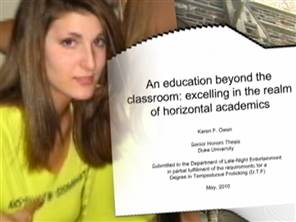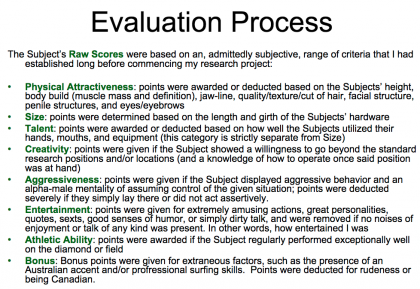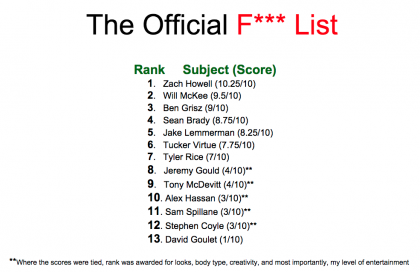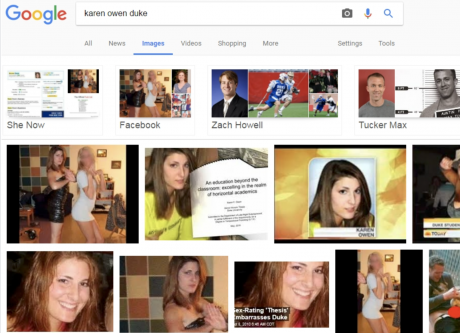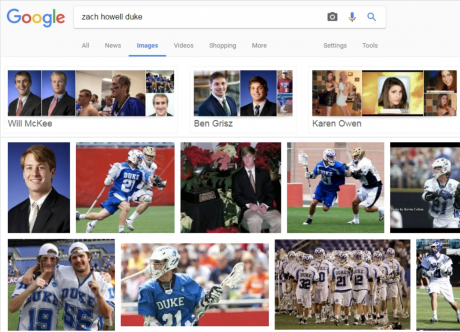Difference between revisions of "Duke F*** List"
| Line 1: | Line 1: | ||
| − | [[File:MainDuke.jpg|right|200px]]The '''Duke F*** List''' is a 42-page Powerpoint presentation created in 2010 by a [https://www.duke.edu/ Duke University] | + | [[File:MainDuke.jpg|right|200px]]The '''Duke F*** List''' is a 42-page Powerpoint presentation created in 2010 by a [https://www.duke.edu/ Duke University] graduate, Karen Owen. The document shared details of sexual encounters with Duke male athletes during her time at the University. Presented jokingly as a 'senior thesis' to her friends, the document was leaked to the public. As a result, legal action was taken against her by several of the male athletes mentioned in her list. [[File:DukeTitle.jpg|right|thumb|Karen Owen with the first title of her slideshow.]] |
==Karen Owen== | ==Karen Owen== | ||
Karen F. Owen grew up in Branford, Connecticut and graduated from high school in 2006. As a college student at Duke, Owen studied History and had a strong interest in sports. <ref name= "LifeAfterInfamy">Alptraum, Lux. “There Is Life After Campus Infamy.” The New York Times, The New York Times, 21 July 2018, www.nytimes.com/2018/07/21/style/campus-sex-women-exposure.html.</ref> | Karen F. Owen grew up in Branford, Connecticut and graduated from high school in 2006. As a college student at Duke, Owen studied History and had a strong interest in sports. <ref name= "LifeAfterInfamy">Alptraum, Lux. “There Is Life After Campus Infamy.” The New York Times, The New York Times, 21 July 2018, www.nytimes.com/2018/07/21/style/campus-sex-women-exposure.html.</ref> | ||
| − | In 2010, Owen released her "faux sex thesis" in the form of a comically thorough PowerPoint shortly after her graduation. She faced significant backlash from members of the Duke community. Because of this, Owen promptly deleted all of her social media accounts. She was contacted by producers and writers about creating documentaries and books about her, but she declined these opportunities. Owen made a point to avoid | + | In 2010, Owen released her "faux sex thesis" in the form of a comically thorough PowerPoint document shortly after her graduation. She faced significant backlash from members of the Duke community. Because of this, Owen promptly deleted all of her social media accounts. She was contacted by producers and writers about creating documentaries and books about her, but she declined these opportunities. Owen made a point to avoid public appearances. <ref name=Control>Hill, Kashmir. “How Karen Owen and Tyler Clementi Lost Control.” Forbes, Forbes Magazine, 11 Aug. 2011, www.forbes.com/sites/kashmirhill/2010/10/01/how-karen-owen-and-tyler-clementi-lost-control/#681f282b159d.</ref> Owen never faced criminal charges. <ref name= "TheseDays">Magary, Drew . “What's Duke ‘Fuck List’ Author Karen Owen Up To These Days? Let's Find Out!” Deadspin, Deadspin, 11 Sept. 2018, deadspin.com/whats-duke-fuck-list-author-karen-owen-up-to-these-da-5912350.</ref> |
==The List== | ==The List== | ||
===Creation and Spread=== | ===Creation and Spread=== | ||
| − | The F*** List supposedly came about when one of Owen's many partners asked her where he ranked among her other sexual | + | The F*** List supposedly came about when one of Owen's many partners asked her where he ranked among her other sexual encounters. <ref name = "hazards"> Flanagan, Caitlin. "The Hazards of Duke". ''The Atlantic'', January/February 2011. https://www.theatlantic.com/magazine/archive/2011/01/the-hazards-of-duke/308328/</ref> The "thesis" was titled ‘An education beyond the classroom: excelling in the realm of horizontal education’, it was originally emailed to three of her friends.<ref>“Duke University Scandal ‘Excelling in the Realm of Horizontal Academics.’” Today24News RSS, today24news.com/breaking/duke-university-scandal-excelling-in-the-realm-of-horizontal-academics-085330.</ref>Evidently, one of which leaked the list and it quickly spread across campus. The list went viral and was picked up by multiple news outlets such as [https://en.wikipedia.org/wiki/Jezebel Jezebel] and [https://en.wikipedia.org/wiki/Deadspin Deadspin]. These sites released the full version of the document without censoring any personal information. |
===Methodology=== | ===Methodology=== | ||
Revision as of 10:36, 23 April 2019
The Duke F*** List is a 42-page Powerpoint presentation created in 2010 by a Duke University graduate, Karen Owen. The document shared details of sexual encounters with Duke male athletes during her time at the University. Presented jokingly as a 'senior thesis' to her friends, the document was leaked to the public. As a result, legal action was taken against her by several of the male athletes mentioned in her list.
Contents
Karen Owen
Karen F. Owen grew up in Branford, Connecticut and graduated from high school in 2006. As a college student at Duke, Owen studied History and had a strong interest in sports. [1] In 2010, Owen released her "faux sex thesis" in the form of a comically thorough PowerPoint document shortly after her graduation. She faced significant backlash from members of the Duke community. Because of this, Owen promptly deleted all of her social media accounts. She was contacted by producers and writers about creating documentaries and books about her, but she declined these opportunities. Owen made a point to avoid public appearances. [2] Owen never faced criminal charges. [3]
The List
Creation and Spread
The F*** List supposedly came about when one of Owen's many partners asked her where he ranked among her other sexual encounters. [4] The "thesis" was titled ‘An education beyond the classroom: excelling in the realm of horizontal education’, it was originally emailed to three of her friends.[5]Evidently, one of which leaked the list and it quickly spread across campus. The list went viral and was picked up by multiple news outlets such as Jezebel and Deadspin. These sites released the full version of the document without censoring any personal information.
Methodology
Each athlete described by Owen was assigned a subject number, followed by explicit details about their sexual encounters. These details included memorable moments, pros, and cons. Ratings were assigned on a 10 point scale using physical attractiveness, size, talent, creativity, aggressiveness, entertainment, athletic ability, and bonus. Tiebreakers were decided based on physical attractiveness.The Aftermath
Following the release of her powerpoint presentation, Karen Owen received a significant amount of backlash from peers and faculty within the Duke community. When Owen wrote the document, she intended to only share with her group of friends as it was supposed to be a private joke. Unfortunately, through multiple postings across social media sites, the document spread faster than unexpected.
Owen quickly made it clear that she had no intention of sharing the project outside of her friend group or releasing personal information of the 13 men. What she failed to understand was that sharing her document online would result in public attention. Within days of the list going viral, she responded by completely erasing her presence on social media with the exception of one private Facebook profile. [3]
Interestingly, most of the men she exposed lacked a public online presence. Owen spoke to Jezebel, stating, “I regret it with all my heart. I would never intentionally hurt the people that are mentioned on that.” Many saw her as a potential female counterpart to Tucker Max, who she explicitly mentioned in her thesis, but she wanted nothing to do with this style of vulgar writing.
Several people identified problematic aspects of college such as the partying culture in which Owen's document revealed and it is something that should be addressed on a larger scale. [1] Not only did people see this as Owen's problem, they also took it out on Duke. GQ magazine, following the F*** List scandal, crowned Duke America's second most "douchy" school. [4] This scandal had not only tarnished Karen Owen's reputation, but also gave Duke University as a whole a bad name. Duke prides itself with rigorous academics and competitive athletics among other things, so it is surely not favorable to be known for a student's F*** List gone viral.
Victims
A large concern was raised for the future and public reputation of the 13 men named in the list by Owen. There were calls for many of the victims to sue Karen Owen, for their privacy to have been compromised unbeknownst to them. The manner in which the victims' lives were affected varied person by person. There were unconfirmed rumors that one of the victims had a job offer from Goldman Sachs rescinded as a result of the presentation leak. None of the mentioned men did formally sue Karen Owen, for unknown reasons.
Many of the men named by Owen are successful today, including Will McKee who is a Vice President and Financial Advisor at Morgan Stanley. To protect their privacy, their connections to the Duke F*** List have been largely redacted.
Online Reaction
Online, many people began to attack Owen for her actions and lack of real accountability once the dust had settled.[6] Interestingly, Tucker Max spoke out and defended her actions, claiming that people accessed her diary and her personal information was compromised. [7] In reality, Owen had no intention of showing this thesis to anyone outside of her friend group. It was one of Owen's friends that posted the thesis without her knowledge or permission.
Ethical Concerns
Privacy
Richard Mason states in Four Ethical Issues of the Information Age that, “Collections of information reveal intimate details about a person and can thereby deprive the person of the opportunity to form certain professional and personal relationships.”[8] This case violated the males’ privacy, as the stories detailed intimate details about their sex lives. Additionally, according to David Shoemaker's definition of control theory, one has informational privacy when control is gained over the access to and presentation of information about one’s self-identity. The protection of one's self-identity is paramount because any breach to one's self-identity undermines one's autonomy and decision over what is publicly presented about themselves. The concept of having control over what is posted about oneself online is a fairly new and debated topic, but in this case and according to Shoemaker, the autonomy of Owen as well as the 13 athletes was compromised as a result of the list's spread over the internet. [9]. According to the control theory, though Owens chose to reveal intimate details about herself, Owen's privacy was also violated by the friend who forwarded the list as well as anyone else who shared the list. This is because her original intention was to give access to the information only to three specific individuals. When the list went viral, media outlets had control of the distribution of Owen's list.
Anonymity
While Owen originally made an oversight, the news sites that published the list failed to protect the anonymity of the men involved. Kathleen Wallace states in Online Anonymity that, “computer-mediated or online communication may encourage the impression that one is anonymous”.[10] While this communication of information started in person, the men didn't expect that this information would surface online. They acted in a manner that was accepted by all immediate parties involved, not with the judgment and opinions of those who ended up being privy to their actions as a result of the list being posted online. But when Jezebel and Deadspin posted the list without blacking out any of the names, these media sites compromised the anonymity of these men and Owen herself. While the original document listed out the names, it was not intended to be spread to mainstream media and the people involved have a right to remain anonymous if desired. Deadspin has since updated the article to exclude names.[11] However, once it was uploaded once names, pictures, education, and extracurricular activities of all the men were instantly spread across the web, not to mention the grotesque details of sexting, dirty talk, and unconventional sexual activities. These websites committed atrocious oversight when releasing information about people to the entire world.
Digital Identity
The Internet gives the individual user the unique ability to speak to more people and, at the same time, alter one’s online identity.[12] If you searched Karen Owen on the internet today, nine years later, all of the results are regarding the Duke scandal. Luciano Floridi provides the statement that new ICTs in our time have evolved the way we interact with and control our own personal data[13]. Karen Owen, as this PowerPoint became viral, saw ICTs cause her to completely lose control of her digital identity, with this story of her PowerPoint being the central descriptor of who she was. This is in direct contrast to a more tailored form of identity production technologies, like social media, in which a person is in complete control of what is included and excluded on his own profile. Thus, one can see that the viral nature of the internet can have irreparable forces on one’s digital identity.
However, this idea is contrasted with the results returned for the men involved in the PowerPoint. If one were to search for the men included in the presentation, one would find very traditional information about them and almost no link to the Duke F*** List. Ben Grisz is a Senior Analytics Consultant at IBM, Zach Howell is a banker, and Jake Lemmerman is an analyst at Taco Bell. The Duke scandal does not come up in their Google searches, while it is the sole search result for Karen Owen and now defines her entire digital identity. The internet holds Karen Owen completely accountable, while the men are unaffected in the long run (aside from psychological embarrassment while the scandal was still fresh news). There is much public debate regarding this double standard and questions are raised as to whether or not this situation would be different if a male were the author instead of a female. Though it has been made clear that Owen never intended for this list to spread to anyone besides the three people she sent it to, she still received the most backlash of any party involved. While the men have went on to become Major League Baseball players or businessmen, Owen's name is tarnished. She has become an "example of everything wrong with college party culture." [1]
As a society, we must now examine how the internet is able to influence one’s reputation and digital identity, and especially in this case how it selectively chose who is affected and who is not. Luciano Floridi also raises the question of the right to be forgotten, which is that if someone should be able to have their history and data removed from public knowledge. For someone like Karen Owen, she will never be able to fully remove the stories and publications regarding this powerpoint, and cannot recreate a new digital identity or destroy her existing one. As ICTs and the internet continue to grow in scale and popularity, this question of whether people have the choice of keeping their data in the public infosphere must be answered. These ideas can ultimately be linked back to an import statement from Jeffery Tobin, “Digitization and cheap online storage make it easier to remember than to forget, shifting out ‘behavioral default’”[14].
References
- ↑ 1.0 1.1 1.2 Alptraum, Lux. “There Is Life After Campus Infamy.” The New York Times, The New York Times, 21 July 2018, www.nytimes.com/2018/07/21/style/campus-sex-women-exposure.html.
- ↑ Hill, Kashmir. “How Karen Owen and Tyler Clementi Lost Control.” Forbes, Forbes Magazine, 11 Aug. 2011, www.forbes.com/sites/kashmirhill/2010/10/01/how-karen-owen-and-tyler-clementi-lost-control/#681f282b159d.
- ↑ 3.0 3.1 Magary, Drew . “What's Duke ‘Fuck List’ Author Karen Owen Up To These Days? Let's Find Out!” Deadspin, Deadspin, 11 Sept. 2018, deadspin.com/whats-duke-fuck-list-author-karen-owen-up-to-these-da-5912350.
- ↑ 4.0 4.1 Flanagan, Caitlin. "The Hazards of Duke". The Atlantic, January/February 2011. https://www.theatlantic.com/magazine/archive/2011/01/the-hazards-of-duke/308328/
- ↑ “Duke University Scandal ‘Excelling in the Realm of Horizontal Academics.’” Today24News RSS, today24news.com/breaking/duke-university-scandal-excelling-in-the-realm-of-horizontal-academics-085330.
- ↑ Kinslow, Tom. “Karen Owen Duke: The Latest From a Messy, Sexy Scandal.” Bleacher Report, Bleacher Report, 17 Sept. 2017, bleacherreport.com/articles/484093-karen-owen-duke-the-latest-from-a-messy-sexy-scandal#slide9.
- ↑ Max, Tucker. “Home.” Tucker Max, 20 Nov. 2011, tuckermax.me/karens-owens-and-the-duke-fuck-list/.
- ↑ Mason, Richard. (1986). Four Ethical Issues of the Information Age. Management Information Systems Quarterly - MISQ. 10. 10.2307/248873.
- ↑ Shoemaker, David W. "Self-exposure and exposure of the self: informational privacy and the presentation of identity." Ethics and Information Technology 12, no. 1 (2010): 3-15. https://doi.org/10.1007/s10676-009-9186-x.
- ↑ Wallace, Kathleen A. “Online Anonymity.” The Handbook of Information and Computer Ethics, by Kenneth Einar. Himma and Herman T. Tavani, John Wiley & Sons, 2008, pp. 165–189.
- ↑ Daulerio, A.J. “The Full Duke University ‘Fuck List’ Thesis From A Former Female Student (UPDATE).” Deadspin, Deadspin, 17 June 2013, deadspin.com/the-full-duke-university-fuck-list-thesis-from-a-form-5652280.
- ↑ Stroud, Scott R."The Dark Side of the Online Self: A Pragmatist Critique of the Growing Plague of Revenge Porn". Department of Communication Studies, University of Texas at Austin, 2014
- ↑ Floridi, Luciano. “The 4th Revolution: How the Infosphere Is Reshaping Human Reality.” The 4th Revolution: How the Infosphere Is Reshaping Human Reality, by Luciano Floridi, Oxford University Press, 2016, pp. 101–128.
- ↑ Toobin, Jeffrey. “The Solace of Oblivion.” The New Yorker, The New Yorker, 19 June 2017, www.newyorker.com/magazine/2014/09/29/solace-oblivion

